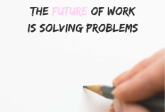Future Work: How Millennials Will Change The Workplace In 5 Years

Millennials are the largest generation in the workforce.
But only a small amount of organisations have adopted the new way of working in order to attract and keep talented employees.
Studies show that 76% of Millennials want a flexible approach to work, which means either hybrid or fully remote work.
Businesses are still hesitant, but remote work has lots of benefits for business.
There are two basic elements that really distinguish Millennials from their predecessors :
1) Their relationship with technology
2) Their relationship with institutions and authority
Technology and the future work
Millennials are digital natives. It’s how we make friends, shop, discover, understand and experience the world around us.
We grew up with technology that developed at a faster rate in history and that makes us by far, the most agile, responsive, and informed generation ever.
This can be positive for employers. By being connected 24/7 Millennials are easily approachable and responsive. Long gone are the days when someone was out of the office, they were effectively out of contact.
The increase in technology has enabled organisations to connect teams/businesses across the globe and as a result, we are seeing an increasing number of distributed teams working cross-culturally, which leads us to another key change in work: globalization.
On a practical level, your IT must be up to par. To run successful remote teams, you should equip your team with a PC or/and laptop, as well as a monitor, along with an ergonomic desk and chair.
You would also need to invest in the right software that will allow employees to gain access to everything they need from home or abroad.
You can stack general software tools like productivity trackers and dairy management to make things as efficient as possible, for example SME cloud computing opinion. This allows your employees to access the information and tools they need from anywhere.
Globalization and the future work
The future workplace is global, without time zones or office hours. Technology makes it possible to telecommute, work from virtual offices and communicate with businesses and individuals across the globe.
Virtual teams are now a reality and all indications are that they will become even more prevalent in the future. A virtual team is a group of individuals who work across time, space, and organizational boundaries. The great thing about them is that employers are now able to hire the best talent for the job regardless of the location utilizing people’s capability without requiring people to move (it’s not very likely that somebody living in the US would move to the UK because you need their expertise).
Having virtual teams saves companies money on overheads and allows them to enter new labour markets and reach new customers.
Independant working means the mindshift change from “managing by seeing” to “managing by results.” 9-5 rule is outdated and meaningless. You could work more hours, or less, but the bottom line is that you only get paid if you deliver what the client wants. If your client or employer is seeking results, and that’s what you are going to be measured by, then they shouldn’t really care where you do it from or how you do it.
Flexibility and the future work
While Baby Boomers and Gen Xers want job security and structure, Millennials want employability and flexibility. Being with one company for life is not the point, however, continually adding to our skills in meaningful ways, is. Work isn’t just about income. It’s about personal enrichment and fullfillment, which means that having flexibility in our work schedules is highly regarded.
Millennials don’t want their work to be school for grown ups, with all the unnecessary rules like set working hours and holidays. We seek a more results oriented work, in which productivity counts for more than doggedly sticking to conventional office hours and regulations.
It’s now been two months since flexible work became an option for all employees in the UK. With over a third (split nearly equally between men and women) of UK employees expressing a desire for a more agile routine. We see that the need and desire for flexible working, involving freedom, choice and trust, is here to stay.
There are many different types of flexible working that you can request. Here is the overview of them all:
Job sharing: This usually means two people being employed in the same role and job and splitting the hours.
Working from home: This is when the employee does some (or all) of the work from home or anywhere else other than the normal place of work.
Part-time: This refers to any arrangement involving working less than full-time hours (usually by working fewer days).
Compressed hours: This means working full-time hours but over fewer days than normal.
Flexitime: The employee chooses when to start and end work (within agreed limits). Usually, the employee will have previously agreed ‘core hours’.
Annualised hours: The employee is required to undertake a certain number of hours over the year but they have some flexibility about when they work.
Staggered hours: The employee has different start, finish and break times from other workers.
Phased retirement: Now that the previous default retirement age has been phased out, older workers have more choice over their employment. This means that they might reduce their hours or work part-time.
Reseraches suggest that having the opportunity to organise work demands around the natural body rhythm may produce positive results in tasks such as resolving conflicts and thinking creatively.
Organisations can optimize costs by reducing unneeded office space (due to employees being out of the office much of the time) and by being environmentally friendly by travelling less.
Collaboration hubs instead of offices
If people are working in their own time and place, the need for a traditional office as we know it (a boring place, where people get together to stare at their screens), becomes a waste of resources.
I see an office becoming a collaboration hub, where employees can meet around the sofa or a round table facing each other to connect, brainstorm and plan; whereas individual work is occurring in a shared space, or outside the office altogether.
Research and practice show that a properly redesigned space (creative and cozy) enabled with the right change management can improve employee collaboration, attract talent, improve employee productivity and innovation and increase well-being.
Authority and the future work
Josh Bersin, writing in Forbes about Millennials cites a study by Deloitte which shows that nearly 50 percent of the Millennials are already in leadership positions, and “most companies are discovering that supporting and retaining this talent requires a new way of doing business.”
Millennials believe the biggest barrier to innovation is management’s attitude; Deloitte concludes, as a result of the economic pressures to flatten organizations, they must build “corporate ‘lattices” rather than corporate ladders for Millennials. It means that young people would like new jobs and new assignments every 12-24 months and won’t wait for 3-5 years for a promotion.
Lack of diversity in the workplace is usually the reason for job-hopping. It makes us restless and bored and we start seeking excitement elsewhere. It doesn’t matter how much someone is paid if a job is unsatisfying then it’s difficult to stay engaged.
The study also points to Millennials’ preference for organizations that have open, transparent, and inclusive leadership styles; and they thrive on fairness and performance-based appraisals, not tenure and seniority.
Millennials would prefer to have access to a number of other leaders, rather than be limited to working with one leader or manager. We are very open to the prospect of reaching out to supervisors, for example, to say: “Here’s a way I would like you to behave that would help me be a better employee for you. I need weekly meetings, I need feedback more often, I need an example of a project you’ve liked before so I can emulate it, I need mentorship…”
We don’t view managers as experts, because we know where to find multiple versions of the information. Instead, we view managers more as coaches and mentors and we want to be able to speak to them without barriers.
It’s no wonder why organizations around the world are so concerned with this new generation of workers – everything they ever knew about work has been turned upside down.
The Talent War is on! What new attitudes, values, and approaches are you going to introduce in your organisation to keep and attract the best people?




